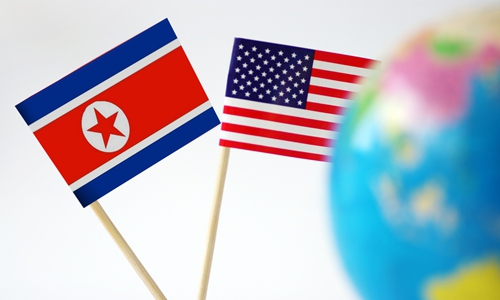
(Photo: IC)
North Korea's recent moves and rhetoric have attracted wide global attention. Pyongyang reportedly carried out a "very important" test on December 7 and another "crucial test" on Friday at the Sohae Satellite Launching Station. Kim Song, North Korean Ambassador to the UN, said on December 7 that "denuclearization is already gone out of the negotiating table."
However, the Northeast Asian country may attempt to pressure the US with regard to talks, rather than refuse to sit across the table. By making those adventurous moves, Pyongyang may seek to express dissatisfaction with US President Donald Trump's revived threats of military action against it on December 3.
Two points are worth noting about Kim Song's remarks on shelving denuclearization talks.
First, the message it revealed was just taking denuclearization off the negotiating table, instead of refusing to talk with Washington. Talks had covered the normalization of ties, lifting economic sanctions slapped by the US on North Korea, and denuclearization on the peninsula. Pyongyang still hopes to negotiate the first two domains with Washington.
Second, North Korea has been using nuclear weapons/missiles as a "means of deterrence" against US military threats. Thus, when Trump raised the possibility of using military force against North Korea, as a response, Pyongyang proposed to take denuclearization off the negotiating table. Yet it doesn't imply Pyongyang would not negotiate with Washington anymore, or abandon its commitment to denuclearization.
In an April speech, North Korean leader Kim Jong-un said he would "wait with patience until the end of the year for the US to come up with a courageous decision." Although the year-end deadline is approaching, the possibility of bilateral negotiations remains. Recent moves by North Korea and the US did lead to an uptick in bilateral tensions, but neither country has indicated shutting the door on talks completely.
What kind of a "Christmas gift" North Korea will send to the US has been discussed. Pyongyang has warned it could take a "new path" amid stalled talks. North Korea's ruling Workers' Party of Korea (WPK) will hold its fifth plenary meeting of the seventh Central Committee of WPK later in December, according to North Korean media reports. One of the crucial points on the agenda might be what kind of "new path" is to be taken and whether it will at all be taken.
Will the Korean Peninsula nuclear issue affect the outcome of the 2020 US presidential election? Actually, it is not pivotal to the vote. Whether the two countries can make breakthroughs or disagree on denuclearization will not affect the electorate's decision.
On the other hand, the impact of US presidential election on denuclearization on the Korean Peninsula would also be limited. It may be one of the subjects in presidential debates, but won't be a core one. The debates would mainly focus on key domestic issues and US ties with major powers, especially China.
Based on the practice by three US presidents over the last 24 years, two of whom were from the Republican Party and one from the Democratic Party, there have not been evident changes in their North Korea policies, despite some differences. Even if Democrats win the election, there will not be substantial change in their policy, such as piling pressure on North Korea to denuclearize.
Currently, both Pyongyang and Washington are engaged in a game of brinkmanship, a practice of attempting to reach a favorable negotiating position by forcing the bilateral interaction to the threshold of confrontation. The strategy is risky and both countries should be cautious lest they should fall into confrontation.
Some analysts worry about current Pyongyang-Washington ties and denuclearization of the peninsula, but I am not pessimistic. Both sides hope to break the stalemate and achieve a deal through negotiations, and neither of them wants to resort to war. North Korea can neither normalize relations with the US, nor coerce it to withdraw the sanctions by launching a war. Meanwhile, Washington cannot achieve denuclearization of the peninsula through military means, either. Peaceful negotiations are the only way to tackle differences; otherwise, bilateral ties would forever be in a stalemate.


